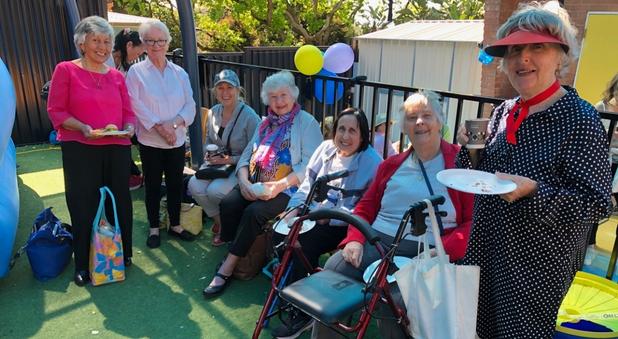One of the best things on TV over the past few years has been Old People’s Home For 4 Year Olds, with its cast of frail, elderly men and women and lively preschool children. We watched avidly – occasionally with a tissue in hand – as, before our eyes, deep, beautiful friendships were made across the generations.
Of course, the show was never just about heartwarming moments and the no-filter comments of the kids. There was a serious point: to see whether the old were able to improve their health, strength and quality of life, and the young learn and grow, particularly in empathy.
The second series was filmed during lockdown in the hall of St Nicolas’, Coogee – and the parish has also hosted two 10-week studies run by researchers from the University of NSW with older people from the community and children from the St Nic’s preschool. These studies have led to a $3.7 million grant from the Federal Government to conduct expanded clinical trials at up to 44 preschool sites over the next two years.
“The thing I think is amazing – and that is where I say God’s hand has been in it – is that a small church like ours could be involved in something like this,” says the Rev Craig Segaert, who was rector of Coogee until his retirement at the end of 2022, and is now the lead community representative on the research committee for the trial.
He adds that while the TV program showed anecdotally that this kind of intervention improves the lives and health of older people – and also benefits the children – what is now needed is scientific data to back this up. That way, governments will be able to see the tangible benefits of funding similar programs across NSW and Australia.
The clinical trials will be conducted in not-for-profit preschools and childcare centres, so there is plenty of opportunity for churches who have linked centres to become involved. Mr Segaert is enthusiastically encouraging them to do so.
“Why wouldn’t you [do it]?” he asks. “The older people who take part in these programs are absolutely blessed – to quote one of them, ‘I’ve got my life back’. And the younger people, the preschoolers, are blessed because they’re getting more contact with older people... and they become friends. And the preschool is blessed because it’s able to incorporate this ground-breaking program into its early years teaching framework, and the church is blessed because it’s able to have prolonged contact with people from the community who they may otherwise never reach!”
Dr Ruth Peters, who leads the team that won the grant, works as program leader for dementia in the Global Brain Health Initiative at The George Institute. She says the plan with the clinical trial is to have 10 adults and 10 preschoolers involved at each site, for two hours a week. The trial begins in April and will run over 20 weeks, with all participants assessed at the beginning and end of the program to measure changes.
While there has been a good deal of research in this area, Dr Peters explains that there has never been anything that has looked at the issue “with a cold scientific eye”.
“I think if we are to go to government and ask, ‘Can you put money into this?’, we need to be able to say, ‘This is the numerical data to back it up – this is what you get for your money’,” she says. “That is what this research will bring.
“Our goal is to provide something that can, ideally, help older adults stay independent, stay active and build relationships in their communities."
"We are measuring frailty – that’s our primary outcome – but we’re also going to measure mood, physical abilities, cognition, thinking skills, memory, planning.
“We’re going to ask people about loneliness, their social connections, sleep... everything where this [trial] might possibly have a benefit in reducing frailty and vulnerability. And then for the kids, it's the development of empathy and, as part of that, school readiness and language.”
Preschools and childcare centres are now being signed up for the clinical trial, after which the team will search for elderly people who live nearby. Any parishes/preschools interested in finding out more can contact Dr Peters at ruth.peters@unsw.edu.au






















